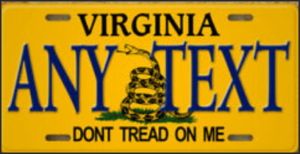 I identify as a rattlesnake. The Department of Motor Vehicles has issued approximately 5,600 drivers licenses and other forms of identification with a “nonbinary” identification since an enabling law went into effect July 1, 2020, reports the Virginia Mercury. “For decades the government put lots of people in boxes in lots of ways,” said the law’s sponsor, Scott Surovell, D-Fairfax. “And going forward I don’t think a lot of young people see themselves that way.” Gee, I thought the purpose of ID cards was to help authorities verify if people are who they say they are, not to be a vehicle for self expression — like, say, customized license plates. Ok, I was wrong about that. How, then, can I, as an ordinary male, express my identity? Surely, it is but a small step from stamping the Gadsden Flag on my license plate to embossing it on my ID card. Do I hear any legislators volunteering to submit a bill?
I identify as a rattlesnake. The Department of Motor Vehicles has issued approximately 5,600 drivers licenses and other forms of identification with a “nonbinary” identification since an enabling law went into effect July 1, 2020, reports the Virginia Mercury. “For decades the government put lots of people in boxes in lots of ways,” said the law’s sponsor, Scott Surovell, D-Fairfax. “And going forward I don’t think a lot of young people see themselves that way.” Gee, I thought the purpose of ID cards was to help authorities verify if people are who they say they are, not to be a vehicle for self expression — like, say, customized license plates. Ok, I was wrong about that. How, then, can I, as an ordinary male, express my identity? Surely, it is but a small step from stamping the Gadsden Flag on my license plate to embossing it on my ID card. Do I hear any legislators volunteering to submit a bill?
Eat your heart out, VCU. The Virginia Commonwealth University police department has, as I recently noted on this blog, appointed two of its officers as liaisons with the LGBTQIA+ community. Not to be outdone, the 170-person University of Virginia police department has hired a full-time Diversity, Equity & Inclusion officer to organize racial and cultural sensitivity training. Indeed, university officers received such training Sept. 1, exactly one week before an unidentified White man hung a noose on a statue of Homer on the University Grounds. The noose, which is associated with lynching, is often considered a symbol of White supremacy. “The recent training allowed police to identify the incident as a hate crime without second-guessing it,” writes The Daily Progress, quoting DEI officer Courtney Hawkins. The article did not explain how hanging a noose on a statue of an old, dead White man constituted a hate crime. Hopefully, the investigation into the incident will identify the perpetrator and illuminate his thinking.
Speaking of hate crimes… University of Virginia Health has organized what it calls Emotional Emancipation Circles where Black students can “heal the emotional legacies of racism and racial trauma.” Participants will “share stories and deepen our understanding of the impact of historical forces on our sense of self-worth, relationships, and communities.” Among other skills, participants will learn “African-centered practices for healing cultural wounds.” I don’t know anything about these African-centered practices, but they have to be better than the Euro-centered practice of cultivating grievance, victimhood, and fragility- and fatalism-inducing self-pity. The further these Emotional Emancipation Circles can distance themselves from Eurocentric psychiatric influences the quicker the healing can begin.


